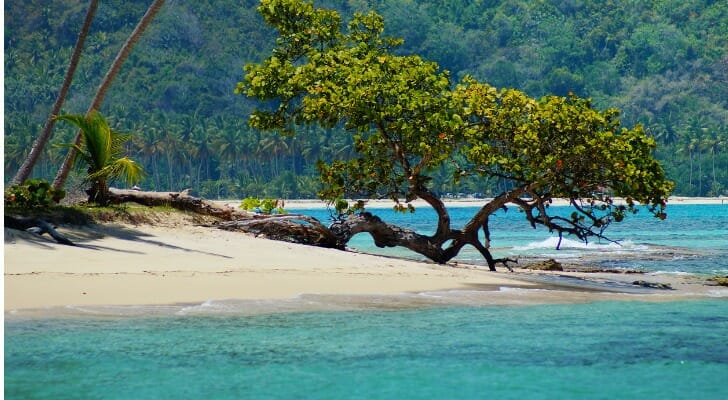15 Pros and Cons of Retiring in the Dominican Republic.
The Caribbean is the perfect retirement destination. The countries in this region have so much to offer retirees, including beautiful weather, gorgeous beaches, and delicious food.
With its low cost of living and proximity to the United States, the Dominican Republic is an increasingly popular destination for US retirees and ex-pats. Like many others, you may have considered moving to the DR, attracted by its stunning beaches, vibrant culture, affordable prices, and good quality of life.
However, before you decide to make your move, it’s essential to know both the good and bad parts of moving to the
Dominican Republic. If you’ve been wondering whether the DR is a good place for you, read on to learn the top pros and cons of retiring there.
1. Pro: Low Cost of Living
The Dominican Republic has a low cost of living. Even in large cities like Santo Domingo and resort towns like Punta Cana, the cost of foods, goods, and services in the Dominican is much lower than in the United States. That’s particularly true if you come from a place like New York City or Miami.
Whether you’ll be living off your Social Security paycheck, your investments, or your savings, you can make your money last longer by living in the Dominican. While you might need to live on a strict budget in the United States, you can enjoy a higher quality of life in the Dominican for the same price.
For example, eating out will suddenly become affordable. Groceries, basic utilities, and other services in the DR are often a fraction of what they cost in the United States.
Numbeo is a helpful website for comparing the cost of living in different cities. However, keep in mind that it relies on user-submitted data, so it’s not 100% accurate, though it can help you get a good ballpark figure.
2. Con: Poor Infrastructure, Corruption, and Bureaucracy
Infrastructure in the Dominican Republic isn’t the worst. However, be prepared for some surprises. For example, you may not be used to dodging low-hanging power cables while walking on a sidewalk. The absence of traffic lights at some intersections may surprise you as well, and crossing the street can get tricky.
Despite that, the Dominican has great highways and well-paved roads, especially in major cities and tourist areas. In more rural areas, however, roads may become impassable.
Like many Latin American countries, the Dominican suffers from corruption. You’ll also face a lot of bureaucracy. Even simple tasks like paying bills can quickly get frustrating.
3. Pro: Delicious and Cheap Food
The Dominican Republic has delicious food at affordable prices. Wherever you go in major cities like Santo Domingo, you’ll come across “cafeterias,” which typically offer food buffets. Just pick the food items you want and pay as you go. The food is traditionally Caribbean and delightful, and menus vary based on the time of the day.
A typical meal at such an eatery won’t cost you more than a few dollars. There is also a lot of street food available, from Dominican salami to empanadas. High-end restaurants are a lot more affordable than in the states, too.
Of course, there is also a lot of fresh fruit. You’ll get access to locally grown fruit, including bananas, avocados, and mangos. Since they tend to come from local crops instead of importation, you’ll find them ripe and juicy. There are also a lot of exotic fruits, like dragon fruit and guava. You can buy fruits at an affordable price in supermarkets or from street vendors.
4. Con: Low Wages
This factor isn’t always critical when retiring, especially if you don’t plan on working again. However, if you think you may need to get a job, even a part-time job, be aware that wages in the Dominican Republic are considerably lower than in the United States. That’s typically true even if you get a high-level position. Low wages come along with the low cost of living.
5. Pro: Cheap Transportation
It’s easy to get around the DR, even if you don’t own a car or motorcycle. Uber and Didi are two popular ridesharing services, and they are quick to come and not expensive. You can even order a motorcycle ride on Uber in places like Santo Domingo to beat the traffic.
Similarly, public transportation is extremely cheap – that goes for both intercity transport and getting around within cities.
6. Con: Constant Traffic Jams
Santo Domingo has some of the
worst traffic in the world, only falling behind cities like Bogotá, Nairobi, and Moscow. Be prepared to get stuck in traffic – a lot. The endless traffic jams can be highly frustrating, especially if you need to get somewhere, so budget extra time for them.
If you plan on driving, be careful. Watch out for potholes, motorcycles zooming in and out of traffic, vehicles driving at night without any lights on, and other unfamiliar and often dangerous driving behaviors. You may be better off not driving at all and instead relying on Uber and public transport.
7. Pro: Beautiful Getaways and Beaches
The Dominican Republic is in the Caribbean, which has some of the best beaches in the world. Wherever you are in the country, a pristine beach is never more than a short drive away.
Even if you live in Santo Domingo, which doesn’t have any beaches, you could always head to
Boca Chica, which is just a 30-45 minute drive away. Punta Cana, with its beaches and resorts, is only a few hours away by car.
8. Pro: Affordable Healthcare
Depending on your retirement age, the cost of healthcare might be one of your top deciding factors when selecting a place to live. The good news is that healthcare in the Dominican Republic is extremely affordable.
The Dominican Republic has free public hospitals. If you’re ever in an emergency, you could always head to one of those hospitals – every town with a significant population will have at least one.
At the same time, the quality of care in those hospitals is not the best, and most ex-pats avoid them unless truly necessary. Furthermore, while care is free, you may have to pay for supplies and x-rays.
Despite that, even private hospitals are affordable, particularly when compared to healthcare costs in the United States. Even advanced and elective procedures cost a lot less. You can also get private insurance that will cover private healthcare, regardless of your age and pre-existing conditions.
9. Con: Low Quality of Healthcare
While healthcare might be affordable, that doesn’t mean it’s good. The Dominican has decent private hospitals, clinics, labs, and doctors. Nevertheless, the quality of care tends not to be as good as in the United States or Europe. Also, in some hospitals, many nurses or doctors may not speak a high level of English.
10. Pro: Vibrant Culture
The Dominican Republic has a vibrant culture. People are friendly, and you’ll have no trouble meeting people. There are plenty of festivals throughout the year. If you love immersing yourself in foreign cultures, the Dominican Republic has a lot to offer.
11. Con: Security Situation in Major Cities
The Dominican Republic has a high level of crime, particularly in large cities like Santo Domingo. You may be at an increased risk of muggings or robberies.
Despite that, there are ways to mitigate the risk. For example, you can avoid walking around late at night, or you can stay in neighborhoods known to be safe. Many ex-pats live in safer communities and cities and never experience any problems.
12. Pro: Ease of Learning the Language
The primary language spoken in the Dominican Republic is Spanish, which is a relatively easy language to learn for native English speakers. That’s because Spanish has a lot of similarities to English, and it uses the Latin alphabet.
The specific accent spoken in the Dominican may not be the easiest to understand. Nevertheless, it will be a lot easier to learn the language and integrate into society, especially when compared to retiring in places like Thailand. Many of you have already taken some Spanish in high school, so you already have a head start.
13. Pro: Ease of Getting to the US and Europe
The Dominican Republic has a great location regarding flight availability and flight time. Getting to Florida takes just a couple of hours, more or less, and going to places like New York only takes a few hours more. Budget airlines like Spirit and airlines like United offer reasonable fare rates to and from hubs like Santo Domingo and Punta Cana.
That might be more important than you think. Besides visiting family, you could go back to the United States to enjoy better quality healthcare. You could even swing by to do some shopping.
Similarly, the Dominican is connected to Europe via Madrid. Various carriers offer flights, which take only 8-9 hours.
14. Pro: It’s Incredibly Easy to Get Residency
Before deciding to retire somewhere, you have to figure out the visa situation in advance. Many countries in Latin America allow you to stay on a tourist visa, but you may have to leave every few months to renew it. Similarly, as a non-resident, you may face certain bureaucratic hurdles.
The Dominican Republic offers one of the easiest residency programs in Latin America, even though tourists only get 30 days the first time they enter. In a matter of months, you can get residency and a Dominican ID card. You can learn more about applying
here.
15. Con: You Will Stand Out
Finally – and this is a big one – you will stand out. Not everyone will stand out as much as others. However, if you don’t speak Spanish well, or if you speak it with a gringo accent, everyone will know you’re a gringo from the moment you open your mouth. People will also be able to tell from the way you walk and other habits – which are hard to shake.
Of course, the same applies when retiring in any foreign country. However, be prepared for people to approach you at times, particularly in tourist areas, trying to sell you something. Even when you make friends, you’ll still be a foreigner, even after living there for many years.
Final Thoughts
The Dominican Republic is one of the best places to retire. There’s a reason so many ex-pats have chosen Santo Domingo, Punta Cana, and other cities in the Dominican Republic!
Of course, no place is perfect. Always weigh the pros and cons before deciding which location is best for you. Make sure to consider things like the healthcare system and infrastructure in the DR before jumping on a plane to enjoy the delicious food and incredible beaches.
After reading this article, you’ll understand why so many ex-pat retirees chose the DR – and maybe you will, too!









